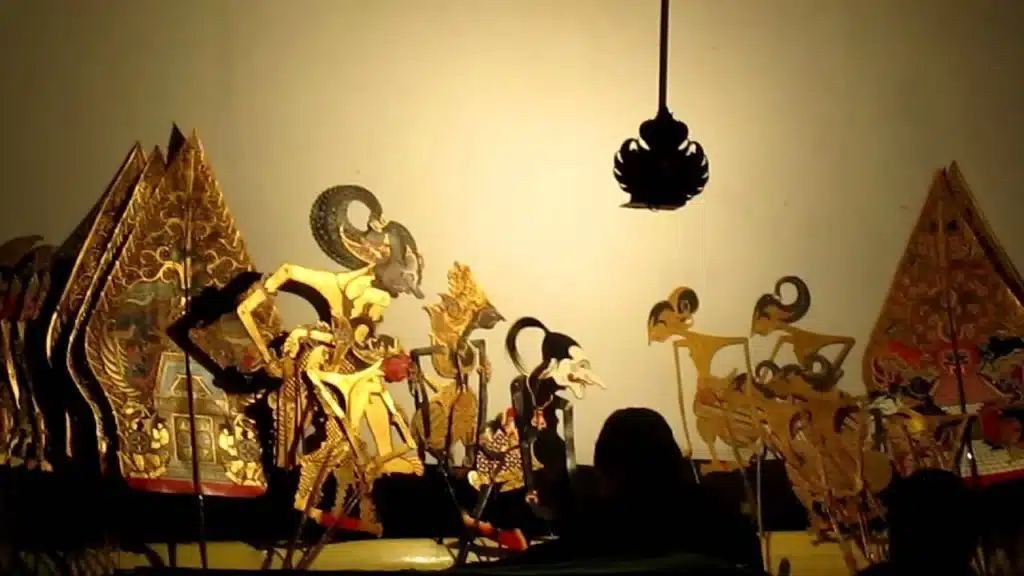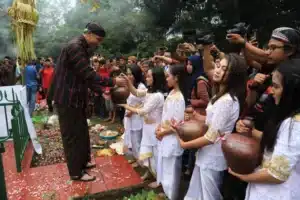Indonesia, with its cultural diversity and traditions, has become a fascinating destination for cultural researchers and tourists. One of the most astonishing and rich cultural heritages is Javanese Culture. Known for its millennium-old traditions, the daily life of the Javanese is still deeply influenced by noble values and local wisdom passed down from generation to generation.
Javanese Culture is not only a precious heritage for Indonesia but also attracts global attention. Amidst progress and modernization, Javanese society continues to strive to preserve its traditions, creating harmony between the past and the present. In this article, we will explore the uniqueness of Javanese culture, examining rooted traditions and delving into the local wisdom that gives a distinctive color to daily life.
11 Traditions and Local Wisdoms of Javanese Culture
1.Javanese Wedding Tradition: Symbol of Harmony
source: idntimes.com
One of the most striking aspects of Javanese Culture is the wedding tradition. The Javanese wedding ceremony is not merely a celebration; it is also laden with symbolic meanings. Customs such as siraman, midodareni, and akad nikah are integral parts of the matrimonial process rich in local wisdom values.
For instance, siraman is a ritual of purifying the bodies of the future spouses with flower water and spices. Besides cleansing the body, siraman is also meant to purify the mind and soul, creating harmony in preparation for married life. Similarly, midodareni is the moment when the families of the prospective couple meet to discuss and decide on the marriage.
The akad nikah, as the culmination of the wedding, is performed with a series of prayers and vows uttered in the presence of witnesses. This procession symbolizes the gravity and commitment to building a family based on local wisdom values.
2.Javanese Culture: A Precious Heritage
source: tourismculture11.blogspot.com
Javanese Culture encompasses various aspects of life, ranging from arts, music, and dance to customs and traditions. Traditional arts such as wayang kulit, gamelan, and batik symbolize the creative richness of Javanese society. Wayang kulit, for example, is not just a performance art; it is also a reflection of deep life philosophy.
Gamelan, a traditional Javanese musical ensemble, stands out with its composition involving various instruments such as gongs, kendang, and saron. The beauty of gamelan music creates a distinctive atmosphere, inviting the listener to feel the sweetness of life.
Meanwhile, batik is an invaluable textile heritage. Batik patterns not only hold aesthetic value but also narrate a profound story and philosophical meaning. Each motif and color has its own significance, reflecting continuously honored life values and local wisdom.
3.Local Wisdom: Inspiring Life Philosophy
source: tirto.id
Javanese Culture is not only visible in formal arts and traditions but also reflected in the daily lives of its people. The local wisdom firmly held by the Javanese has inspired many to live wisely and meaningfully.
One of the key concepts of Javanese local wisdom is “gotong royong.” Gotong royong represents the spirit of mutual cooperation and assistance in daily life. Javanese people consider it crucial to overcome difficulties and share happiness together. This concept fosters a sense of unity and solidarity among them.
Moreover, the life philosophy “Rasa, Suka, Duka” is also a guide for many Javanese. This means a person is supposed to have empathy towards others, feel joy together in happiness, and support each other in sadness. This concept reflects sensitivity to the feelings of others and creates close bonds within Javanese society.
4.Preservation of Cultural Heritage: Challenges and Hopes
source: cintaindonesia.web.id
While Javanese Culture has exceptional richness, its sustainability and preservation pose a real challenge. Modernization and globalization impact traditional values, making preservation efforts crucial.
The importance of preserving Javanese Culture has been acknowledged by various stakeholders, be it the government, cultural institutions, or the society itself. Preservation and revitalization programs, such as cultural festivals, art exhibitions, and cultural education in schools, are positive steps toward safeguarding this cultural heritage.
5.Local Wisdom in Daily Life
source: mamikos.com
In addition to being expressed in traditional rituals, Javanese local wisdom also manifests in daily life. Concepts like “sopo wani, sopo ngerti, sopo iso” (who dares, who understands, who can) guide the population through life’s challenges. Javanese believe that by supporting each other and collaborating, they can overcome all difficulties.
Gotong royong is also visible in daily life, especially in rural areas. Javanese people are actively involved in gotong royong for activities such as environmental cleaning, renovation of worship places, or helping neighbors in need. This creates an atmosphere of camaraderie and family that is hard to find elsewhere.
6.Literature and Javanese Local Wisdom
An invaluable cultural heritage of Javanese Culture is its literature. Literary works such as Serat Centhini, Serat Wedhatama, and Serat Jayabaya are not just readings but also deep sources of local wisdom. The stories and moral teachings contained in Javanese literature serve as life guides for many.
For example, Serat Centhini summarizes various aspects of life, from life philosophy to ethics and wise counsel. Similarly, Serat Wedhatama addresses politeness and appropriate behavior in society. Javanese literature enriches local wisdom and makes it an integral part of daily life.
7.Performing Arts and Popular Arts
Apart from wayang kulit and gamelan, other forms of performing arts such as ludruk, ketoprak, and traditional dance also play a crucial role in preserving Javanese Culture. Ludruk, a form of popular theater, represents daily life in a humorous and entertaining manner. Ketoprak performances, with plots rich in moral values, serve as a means of conveying messages to the population.
Traditional dance such as Jaranan and Reog Ponorogo reflects the richness of Javanese Culture through captivating movements and costumes. Each dance movement has a deep symbolic meaning, often depicting epic stories or the daily life of the Javanese.
8.Culinary Culture: The Delicacy of Local Wisdom
source : pinterest.com
Javanese local wisdom is not only manifested in arts and traditions but also reflected in its distinctive cuisine. Javanese cuisine, with its characteristic spices, creates unique and delicious flavors. Traditional dishes such as nasi gudeg, sate, and pecel are integral parts of daily life.
For instance, nasi gudeg is a typical dish from Yogyakarta made from young jackfruits cooked with coconut milk and spices. Sate, with grilled meat served with peanut sauce, is a popular dish throughout Indonesia. Pecel, with vegetables drizzled with peanut sauce, is a healthy dish enjoyed by many.
Read also: 22 Javanese Culinary Specialties to Try: Immerse in the Delicacy of the Archipelago’s Cuisine
9.Balancing Tradition and Modernity
Facing globalization and modernization, Javanese society stands at the crossroads between preserving traditions and keeping up with the developments of its time. While open to change, they strive to maintain a balance between traditional values and modern ones.
Formal education in Java reflects this by still teaching cultural values and customs from a young age. Programs focusing on learning traditional culture and arts in schools aim to preserve this cultural heritage without compromising the progress of modern education.
10.Role of Social Media in Promoting Javanese Culture
In this digital era, social media plays a crucial role in the promotion and preservation of Javanese Culture. Many accounts on platforms like Instagram and YouTube creatively showcase the beauty and local wisdom of Java. Video tutorials on batik, content about customs, and cultural teachings find an effective way to introduce Javanese Culture to the younger generation.
11.Challenges of Globalization and Creative Opportunities
Although Javanese Culture strives to preserve its authenticity, globalization presents challenges. The influence of foreign cultures can affect the thinking and lifestyles of the Javanese. Therefore, it is crucial for Javanese society to remain grounded in local wisdom while being open to positive changes.
On the other hand, globalization also offers opportunities for creativity and innovation. Through cultural exchanges with the international community, Javanese Culture can become more widely known and appreciated. Intercultural collaboration can be a way to strengthen cultural sustainability and create harmony amidst differences.
Conclusion
Javanese Culture is an amazing journey through history, art, and daily life of a society rich in local wisdom. From wedding traditions full of symbols to profound life philosophy, Javanese Culture offers valuable teachings on harmony, solidarity, and empathy towards others.
By exploring the richness of Javanese Culture, we are reminded to maintain and preserve this invaluable heritage. Thus, we not only inherit cultural richness but also pass it on to future generations. May this article serve as an open window to the beauty of Javanese Culture and inspire us to deepen our understanding and ensure its sustainability. Visit the island of Java with Salut Bali we are ready to help you plan your trip to Java to enjoy the beauty of nature and Javanese culture. Contact us now!










